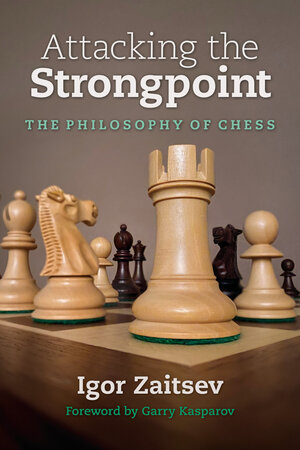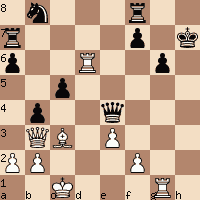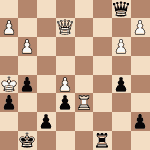The filter “Is it true, is it necessary, is it kind?” has been attributed to Socrates and Buddhism, among other sources. Using the first two questions, Dr. Alexey Root examines one quote from Attacking the Strongpoint: The Philosophy of Chess by Grandmaster Igor Zaitsev. Then she considers diets.

Attacking the Strongpoint: The Philosophy of Chess, by Grandmaster Igor Zaitsev, offers many ideas for how to approach one’s opponent and what to think about during a chess game. Zaitsev trained world champions Tigran Petrosian and Anatoly Karpov. The latter wrote a tribute which begins the book. Zaitsev also is a strong player. Check out this position, which he achieved as White against Boris Spassky, who later became world champion. What would you play as White?

Click to reveal the answer
23.Qc4 and if Black takes the queen, 23…Qxc4 24. Rh1+ wins.
I enjoyed the book’s annotated games, played by Zaitsev and by other strong players. I was sometimes confused by Zaitsev’s chess ideas. For example, on page 43, Zaitsev wrote:
Strategy is most directly connected with pawn structure and is chiefly oriented to it. Strategy, figuratively speaking, is in fact just pawn play. Every alteration in the pawns, whether by capture or by advance, indubitably bears a strategic character. When the last of the pawns leaves the board, although there may be calculation and planning, there is no longer strategy — only tactics.
I understand very little about this quote. I thought strategy is what happens when there are no tactics. That is, I thought strategy involves maneuvering to achieve goals, such as controlling the center or maximizing the mobility of one’s pieces. Is it true, as Zaitsev wrote, that there is no strategy when the pawns have left the board? Is checkmating with a bishop and knight only tactics, and not strategy? I don’t know if the quote is true.

I also don’t know if the quote is necessary. That is, I am not sure how Zaitsev’s paragraph, even if I understood it, would improve my chess game. I am equally confused by diets. You can read my first chess and weight loss article here, and my second one here.
My co-author for an outdoor chess article, International Master Alex Wohl, is on a ketogenic diet. He wrote, “Basically I just stick to animal products and vegetables. No processed food. A few years ago I was 115kg, had very high blood pressure and was pre-diabetic. Now I’m 85kg and all other health issues have disappeared as if by magic.” My former student John Hendrick is trying a fast-mimicking diet. He and his wife Dani each lost five pounds in their first five days and plan another round of the diet soon. A friend from my college days, Leah, and her husband Dave Wegener follow a whole-food, plant-based diet. They were profiled for losing weight in the magazine Forks Over Knives (Winter 2021 issue). You can read Dave’s story on his website too.
Many friends, many diets! I am not sure what’s true, scientifically. But what’s necessary, at least for me, is to have a full plate. I like eating a lot of food! With a whole-food, plant-based diet, I can fill up my plate. Yet, after cleaning my plate, I have consumed very few calories.
I’m still tempted by processed foods, especially when those foods are free. For example, I loved getting a free Krispy Kreme doughnut for being vaccinated against Covid-19. I’m planning to report on my weight when I reach my goal weight. Look for that future SparkChess article, a “Chess and Weight Loss (part 4),” I hope sooner rather than later! I may have to give up the doughnuts.
